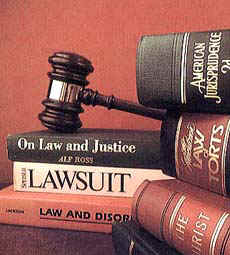Is an Online Lawsuit in Your Future?
 The age of the Internet has meant many things, including more cases for savvy lawyers who are looking to cash in.
The age of the Internet has meant many things, including more cases for savvy lawyers who are looking to cash in.
It is no secret that many legal offices now have employees on the payroll specifically to look for and set online lawsuits in motion, given the potential financial awards that one can obtain.
While the Internet and social media have always revolved around free expression and the ability for one to freely promote, they have also opened the door to instances where defamation becomes an issue. In those cases, companies and/or individuals have called in the lawyers.
One such area of interest that has appeared on lawyers’ screens is Twitter.
Can a tweet about a product, company or individual be held up as possible defamation towards that entity? The answer in a number of instances has been yes. While that doesn’t mean that the lawyer should be on speed dial, it does mean that individuals and businesses for that matter need to think before they tweet or use another social media tool.
Here are a few scenarios of what one would likely be advised to do and not to do when sitting down and tweeting for example:
Likely Acceptable – The food at the so-and-so restaurant was under cooked and cold, while the service was terrible. I would not recommend going there;
Likely Unacceptable – The owner, John Griffith, seemed to cater to white customers only and came across to me as a racist;
Likely Acceptable – My former employer, Bob Smith, never gave me a fair chance to prove myself. He always seemed to give preferential treatment to the female employees, even those who do not have my experience or skill level;
Likely Unacceptable – My former employer, Bob Smith, is a pervert. He oftentimes hit on the young female interns, thinking no one witnessed this. I think he may have chased some of them away from the company. Now I know why he oftentimes had his door closed when meeting with some of them.
Computer users should keep in mind that while social media venues like Twitter and Facebook can be free from being sued, it is oftentimes a different story for individuals. Businesses who feel they were defamed by an individual could very well have a case to pursue.
On the down side, the resulting PR from such a lawsuit could end up being worse than the original message. Businesses who have forums available to customers or come across such forums not on their Web sites, should weigh each comment individually before responding or dialing up a lawyer, thinking about if the bad outweighs the good over time.
Oftentimes, businesses who are hit with criticism over the products and services they provide never plan to follow through with an actual lawsuit. Instead, they use the possibility of a lawsuit as a fear tool, hoping the perpetrator of such negative online comments will back down and cease the attack.
Another item for businesses to keep in mind is hosting their own online forums, where individuals may decide to talk about a rival company for example in a negative manner.
Can the business who is hosting such a platform be sued for defamation even though it did not actually post the original comment? The answer to that question is a little stickier, as it involves the matter of opinion versus slander.
Given our freedom of speech protections in this society, stating one’s opinion is clearly within the framework of the Constitution.
Where a company or individual may take issue is when it feels such comments are interpreted as fact, thereby damaging one’s ability to do business and make money.
Anyone (individual or business) who plans on going online to post a comment related to an experience with another person or company should do so with some caution, given the fact that today’s sue first; ask questions later world is providing lawyers with greater incomes.
Heck, who wants to see lawyers making any more money?
Dave Thomas is an expert writer on payroll services and is based in San Diego, California. He writes extensively for an online resource that provides expert advice on purchasing and outsourcing decisions for small business owners and entrepreneurs at Resource Nation.


You’ve made some really good points!!! we really should watch out from what and how we’re saying what’s on our mind….
Thanks a lot!
I completely understand why there should be a possibility of lawsuit. It cuts both ways … sometimes because there is an easy and news hungry social platform, people can abuse it. Slander and libel are not tolerated in the offline world, why should online be any different.
Amanda,
I agree especially with your last sentence. One interesting thing people should think about before posting something perceived as slander or libel is there is an online paper trail. Unlike a document that can be destroyed, online posts inevitably will be tracked down even if someone tries to erase them. One of my previous jobs involved monitoring an online forum. It was amazing how many people would try and sneak in negative comments on a weekend when they thought no one was watching.
Great post! Many social media management companies do not see the need for professional indemnity insurance because they are only doing good for their clients. However, today’s litigious society means that we need to have protection because it is easy to interpret a written comment in many ways that we might not have envisaged when originally typing it. Intonation can be crucial.
You have create good points and analysis! Saying directly without asking questions is crucial. We need to think first before we say it.